General
Mak Hosts Academics Day as Uganda-France Mark Friendship Week
Published
9 years agoon
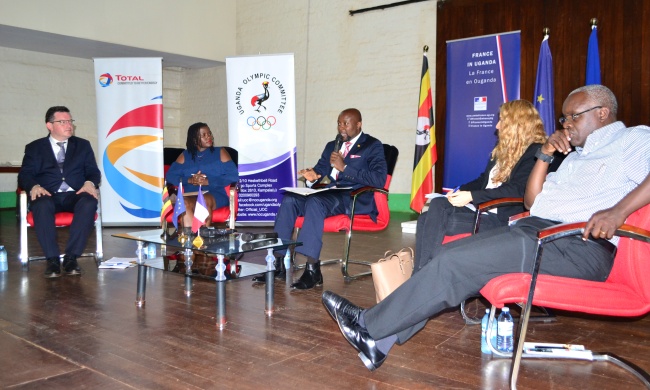
The Academics Day was one of the activities hosted by Makerere University on Wednesday, 22nd March 2017 to celebrate the Uganda-France Friendship Week 2017. The Academics Day was graced by H.E Stephanie Rivoal, France’s Ambassador to Uganda.
The Head, International Relations Office-Ms. Martha Muwanguzi welcomed the Ambassador, Panelists and Guests to the debate and highlighted the items for the day’s debate. The audience was composed of staff from the French Embassy in Kampala, Directors of French Companies in Uganda, Makerere staff and students, French men and women, the media and members of the general public.
In his remarks, the Deputy Vice Chancellor (Academic Affairs)-Assoc. Prof. Ernest Okello Ogwang welcomed H.E Stephanie Rivoal and expressed his appreciation for the cordial relationship between Uganda and France. “As a University, we are very grateful for the support extended to us in form of scholarships for PhD studies, staff exchanges and support to the teaching of the French Language, to mention but a few.”
“Today, we are gathered to discuss the role of the youth in media on one hand and politics on the other hand. This is an important conversation given that the youth are the future of our world. Their place in shaping the agenda of tomorrow is therefore central and should be guided and harnessed for the best outcome.”
Assoc. Prof. Okello Ogwang thanked the French Embassy for taking a special interest in knowledge transfer partnerships and networking, which is one of the core functions of Makerere University. He pledged the University’s commitment to furthering this and other mutually beneficial activities.
H.E Rivoal welcomed everyone who had honored her Embassy’s invitation. She then went on to introduce Mr. Mwambutsya Ndebesa to give the keynote address of the day.
In his address, Mr. Mwambutsya Ndebesa, a political historian from the College of Humanities and Social Sciences (CHUSS) quoted Edmund Burke (1729-1797), “The only thing necessary for the triumph of evil is for good people to do nothing”. He also quoted Frantz Fanon (1925-1961), “Each generation must discover its mission, fulfill it or betray it”.
He emphasized that if anybody thinks s/he is a good person but does not do something to avert evil, then s/he is an accomplice in that evil. “So what is the mission of your generation as youth today? Have the today’s youths defined their mission? Are they ready to fulfill it by participating in public affairs?” questioned Mr. Ndebesa.
He noted that many youth seemingly participate in public affairs when in actual fact they are “participated”. He elaborated that “participated” is to engage in a public exercise whose agenda you do not know and where your engagement has no influence or is of no consequence and you therefore do not shape the future in a positive way. “Are youths of Uganda citizens or subjects? A citizen actively participates in shaping his destiny and that of his country or community. Are youths merely occupied in private affairs only or are they also actively engaged in public affairs? Youths should not be subjects.”
Mr. Ndebesa said that the Uganda-France Friendship should be informed by the core values established by their forefathers during the 1789 revolution summarized in their motto of Liberty, Equality and Fraternity. “This is shared between France and Uganda. In Africa, our forefathers established a universal principle and humanity core value of “Ubuntu” which stands for humanity towards others. Therefore youths of France and Uganda should be informed by the two principles of Ubuntu and Fraternity which promote universal cooperation and good living in a shared sense of humanity.
“The media has a role to play in promoting values of fraternity and Ubuntu and shun ideas of nationalisms and fundamentalism. The media should promote politics of justice, tolerance and accommodation among peoples of different races, creeds, nationalities and tribes. The media should have editorial policies that identify, expose and discourage any forms of xenophobic, hate speech and tribal politics alike” shared Mr. Ndebesa.
He noted that the media sometimes abuses its power and promotes interests of politicians and their political parties. He stressed that the media in France and Uganda just like the youth should identify its mission to humanity, fulfill it or betray it. “This mission should be guided by the core values which should be promoted together with culture” concluded Mr. Ndebesa.
The first debate was on ‘Youth and Media’ with panelists from the French and Ugandan media. The CEO Vision Group-Mr. Robert Kabushenga said that the objective of the media is to be as neutral and sincere as possible, educate people and empower them with knowledge. The media in the Ugandan context has is in most cases however been accused of not being neutral and leaning towards a certain political ideology.
Mr. Samson Kasumba who moderated the debate then put the panelists to task as to whether the media was context specific or international? Ms. Rosebell Kagumire, a Ugandan journalist and blogger said the main role of the media is to inform and create a level ground that fosters discussion. “These days, the media has become too commercialized to allow a level ground. The one with more money gets more time to air his views and also use it to campaign. The media tends to give more coverage to the one who pays them to and deny others a chance of airing an opponents’ views and ideology.”
“There are cases where some radio and television stations were shut down or threatened with closure when they hosted prominent opposition politicians. In other words, neutrality in the media is not there. It was agreed and pointed out that, every country must invest money in a public media platform that can be used by all regardless of one’s ideology. This way, the media will be serving humanity instead of being used by narrow minded politicians” noted Ms. Kagumire.
She also stressed the need for media houses to facilitate their staff with the right equipment and other necessary tools. “Their personnel should have transport to reach different places and get first hand information and make responsible reporting to the public instead of hearsay which might tarnish peoples’ personalities,” she advised.
The Second session on ‘Youth and Politics’ featured two Ugandan and two French panelists. The Uganda panelists were Ms Isabella Akiteng-Director, Uganda Youth Network and Mr. Ivan Rugambwa. The Ugandans made a case for what is important to the Youth and what shapes their lives. They both shared that the youth are eager to see that they make a contribution to society and that the programs they put across are relevant to society. In the Ugandan context, Youth are those between 15 – 35 years although many above 35 and below 50 years also consider themselves as youth. These different categories make different contributions to society.
The first French panelist, Ms. Claire Sergent had a different view; freedom is more important for one to do as s/he pleases. The second French panelist Mr. Steve Coudray said that learning was more important to him and any obstacle to learning would destabilize his life and planning for his life. Youths should not just be used at the time of voting but should learn from older people how to engage in politics that benefits society. He believed that it is not only older people that can make successful leaders such as Presidents, “even the youths can spire for such positions provided they have the knowledge and can deliver services to the citizens.”
Mr. Coudray threw the audience into a bout of laughter when put to task by the moderator, Mr. Kasumba whether at 26 years, he could contest for the French Presidency in the next elections slated for July, and he replied in the affirmative. He defended his position by stating that it was not age but the ideas that he will bring forward that will convince people to elect him as their President.
Youth have to change and have a positive attitude towards life. First and foremost, they should acquire as much knowledge as possible. It is only an informed and knowledgeable person who can bring about change. Ms. Akiteng emphasized the importance of youths being knowledgeable and gave an example of the hundreds of child mothers in Teso area where she comes from. “They know nothing about reproductive health and how to prevent early pregnancies.”
Ms. Akiteng went on to say that if people are not informed, then they will have no knowledge. “Services have to be taken to the people and explain to the populace the importance of those services in a language they understand. Many of the ills we are facing today in our society is a failure of government implementing policies it puts in place and educating its citizens about their importance. Politics has become so commercialized to the disadvantage of the youths many of whom are unemployed and therefore hang around politicians who do not lobby for services to their constituencies but can pay the youths to campaign for them.”
Mr. Rugambwa on the other hand said, “Youth always follow old people and hang around old politicians because of what they learn from them and what they can get from them monetary-wise. It is difficult for youths to start new political parties when they are unemployed, so they use existing institutions (political parties). The older people construct ideologies which young people follow until when they mature and are able to take over from their mentors.”
All in all, the youth should get ready to participate in public affairs without expecting any returns. The youth, regardless of country or environment, should identify their mission, fulfill it or betray it. Instead of complaining about what the government has failed to do, the youth should get involved and play their role in serving humanity in the best way possible, guided by the core values of ‘Ubuntu’ and ‘Fraternity’.
Article by Martha Muwanguzi, International Relations Office
You may like
General
Makerere Explores Strategic Industry Partnership with Psalms Food Industries to Strengthen Manufacturing Innovation
Published
13 hours agoon
March 4, 2026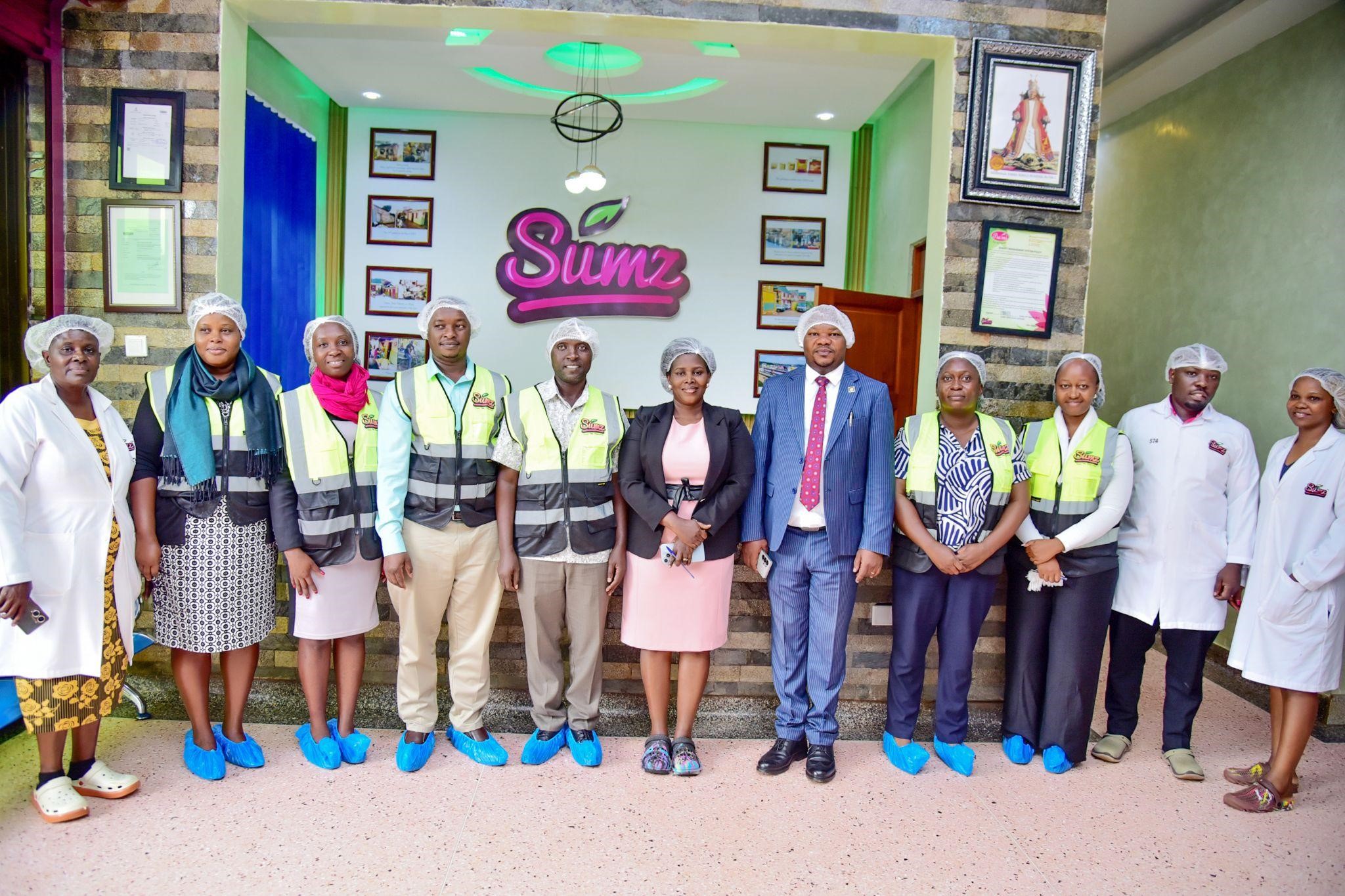
On 2nd March, 2026, representatives from the Advancement Office, the College of Business and Management Sciences and the University Innovation Pod visited Psalms Food Industries to discuss a prospective partnership aimed at strengthening university–industry collaboration in manufacturing, research, innovation, and skills development.
Psalms Food Industries, a homegrown snacks innovation and manufacturing company, operates three major brands, namely, Sumz, Afrikan Harvest and Krunchables, which have grown to a range of 37 products and target the introduction of five new products annually. The company distributes products across Kenya, Rwanda, the Democratic Republic of Congo, South Sudan, and, recently, Tanzania. As a labour of love, the idea of producing snacks was born during the honeymoon of Mr and Mrs Ngabirano, who now run Psalms Food Industries side by side.
Dr. Denis Ngabirano, CEO and Co-Founder of Psalms Food Industries, during the meeting, described the company as “a snacks innovation house, with all our products developed in-house.” He noted.
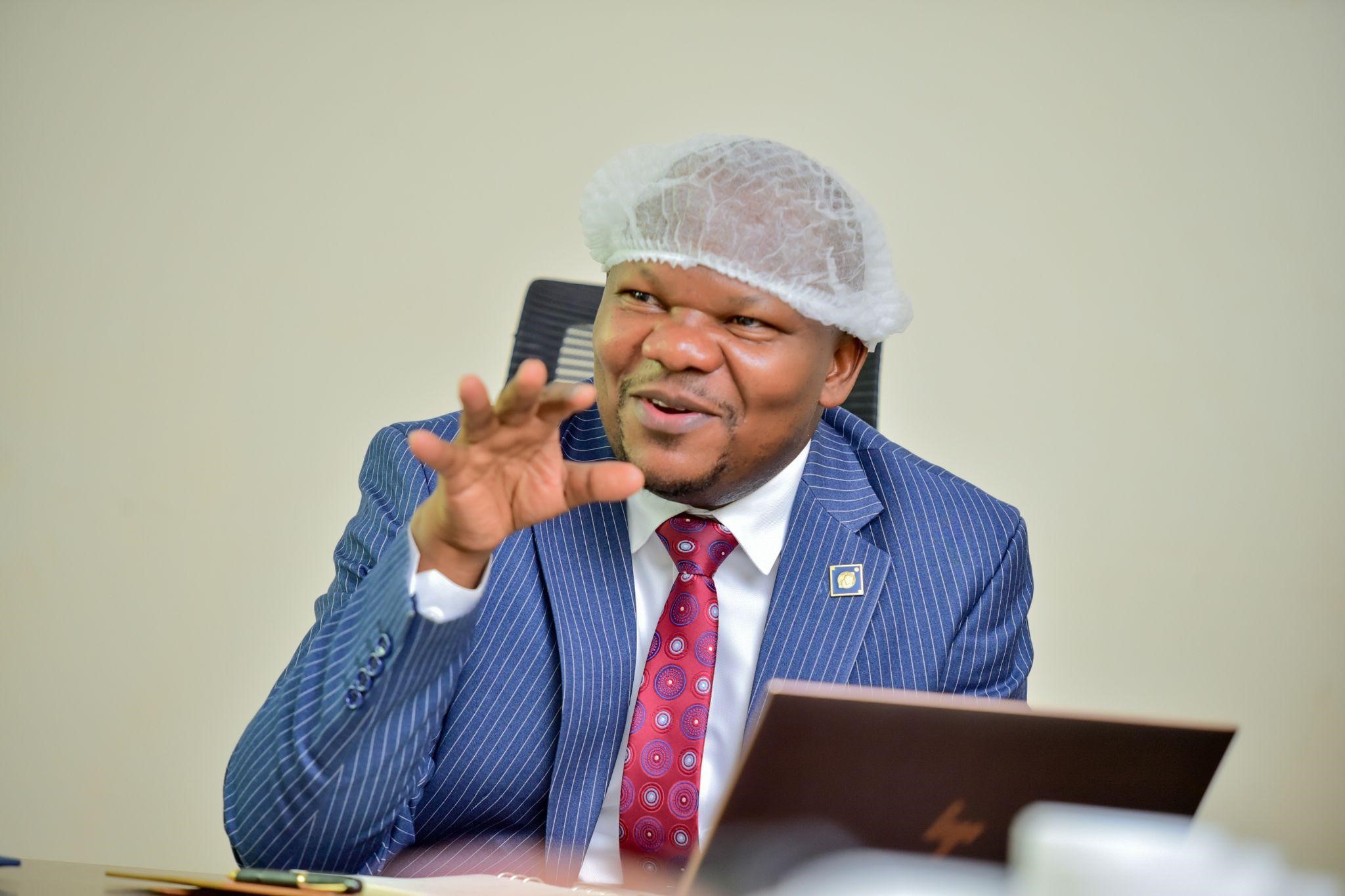
He emphasised the company’s commitment to quality assurance and consumer-centred research, noting that Psalms conducts surveys and gathers customer feedback to inform product development, supported by an internal microbiology and chemistry laboratory.
Dr. Denis Ngabirano noted that the company had only recently introduced two brands, “Afrikan Harvest for it’s health conscious clientele and Kruchables for it’s volume centric clientele.
“Afrikan Harvest has no additives, it is a brand for health-focused consumers,” he explained, while highlighting the differentiated positioning of their product lines. “Sumz is our premium brand, and Krunchables focuses on volume.”
Student-Centered Experiential Learning
A key focus of the meeting was structured experiential learning for students across disciplines. Potential areas of collaboration include internships, graduate trainee pathways, and hands-on exposure within Psalms’ incubation and production facilities.
The proposed engagement spans multiple fields, including environmental sciences, engineering, procurement and logistics, finance and accounting, quality control, production and manufacturing, human resource management, marketing, and international business.
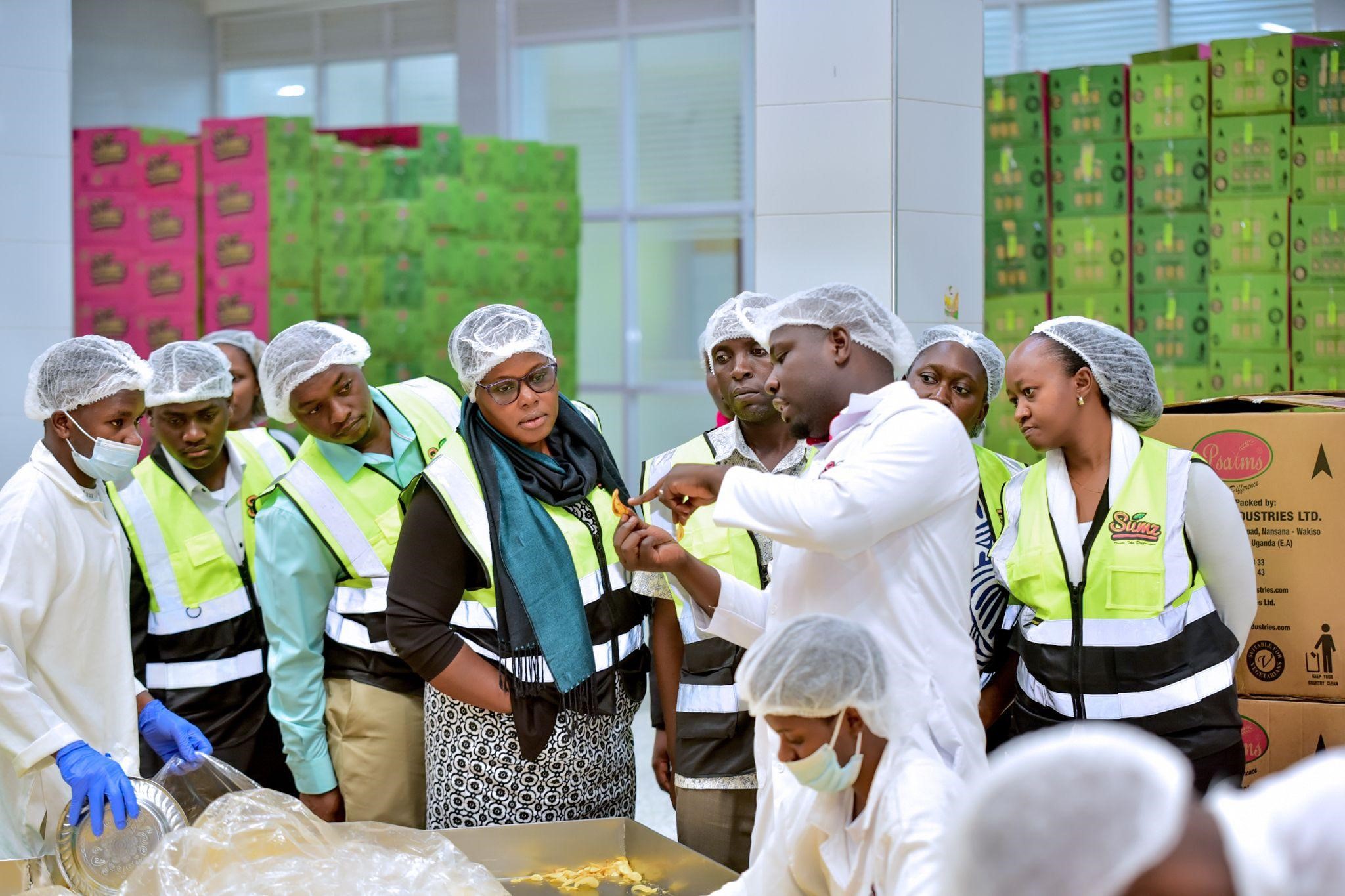
The partnership could provide students with direct exposure to real-time production systems, standard operating procedures (SOPs), and quality assurance frameworks, strengthening the practical relevance of their academic training.
Among the innovative ideas discussed was a potential competition involving students from the Fine Art and Industrial Design disciplines to redesign packaging for selected Sumz products. The proposal would allow top designs to be commercially adopted, creating a direct bridge between creativity, intellectual property development, and industrial application.
Research, Innovation and Commercialisation
Both institutions expressed interest in joint applied research initiatives, particularly in process optimisation, data analytics for manufacturing efficiency, product improvement, and sustainable production systems.
Opportunities were also discussed around collaborative research in machine design, crop development for snack processing, and factory energy solutions, areas that not only benefit Psalms but have broader implications for Uganda’s manufacturing sector.
The engagement further highlighted potential linkages with the University’s innovation and commercialisation structures, including the University Innovation Pod (UNIPOD), to support co-creation and scaling of student-led innovations.
Mr Awel Uwihanganye, Chief Advancement Officer at Makerere University, proposed strengthening the engagement through structured programming, including a planned collaboration between the University’s innovation Hub and the upcoming incubation Hub at Psalms Food Industries, particularly to support the commercialisation of research outcomes for both students and staff.
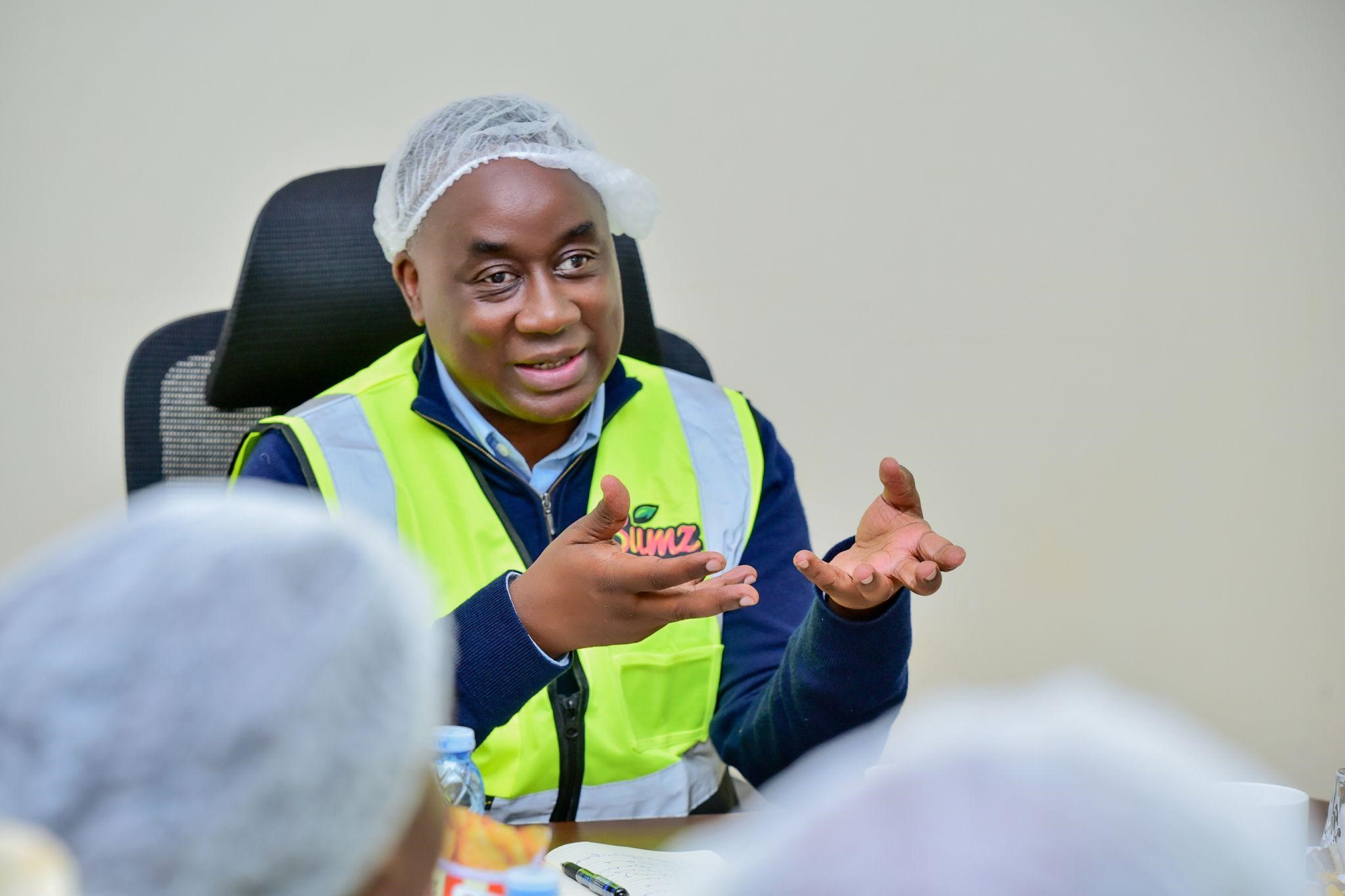
Curriculum Co-Creation and Staff Exchange
Beyond student placements, discussions also focused on co-developing academic content that responds more directly to industry needs, particularly within the manufacturing value chain.
Proposals included guest lectures by industry practitioners, staff exchange programmes to expose academic staff to factory operations, and tailored short courses for Psalms staff based on identified skills gaps.
Dr. Jude Mugarura, Head of the Department of Marketing and Management at COBAMS, emphasised the importance of embedding the partnership within academic programming. He proposed “internships for students in HR, marketing, international business, accounting and finance,” as well as staff exchanges to give University staff hands-on exposure to manufacturing operations.
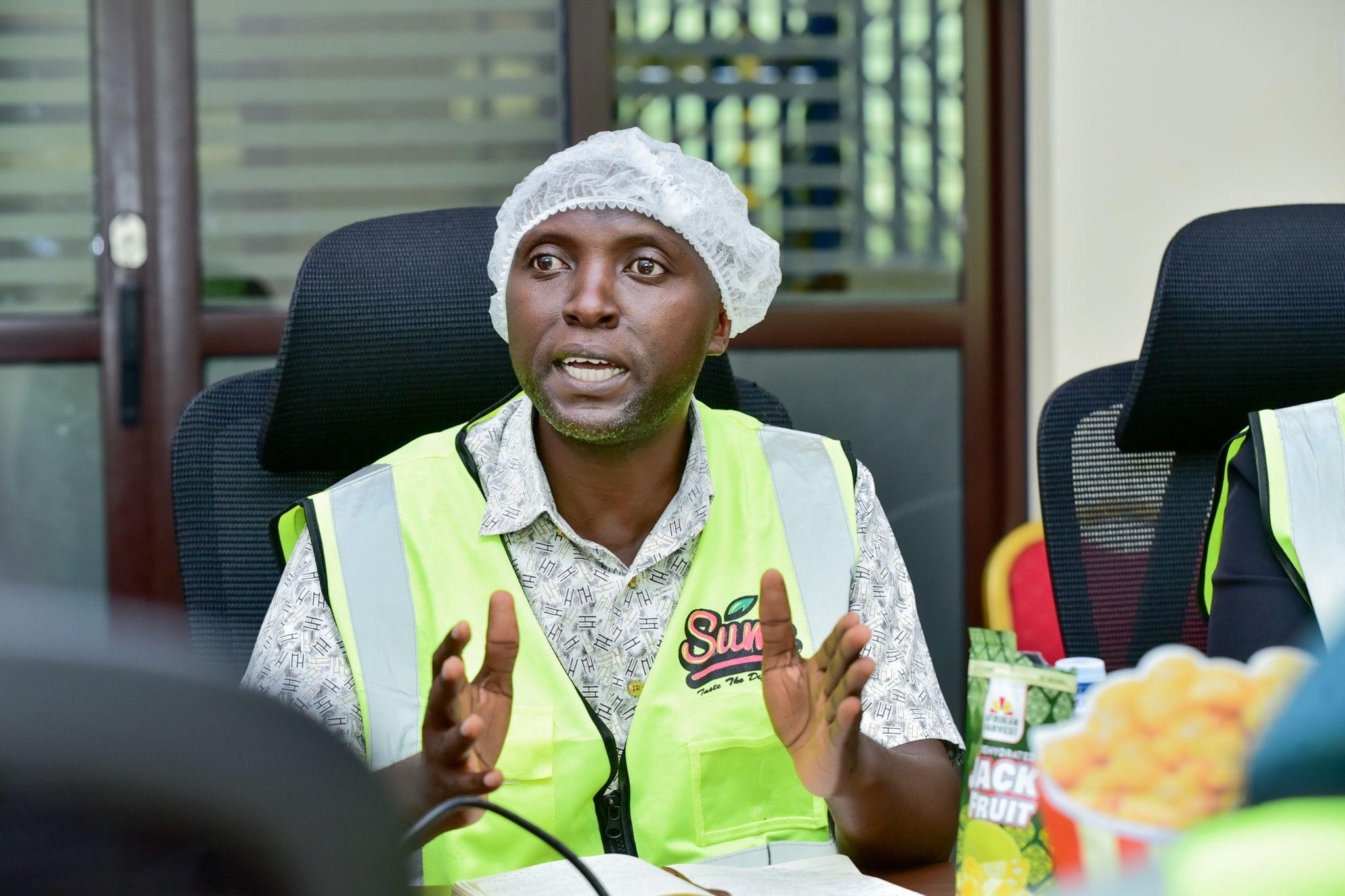
He further suggested specialised courses tailored to the factory’s needs and attachment of research students interested in manufacturing. Such collaboration would contribute to curriculum responsiveness and ensure that graduates are equipped with market-relevant competencies.
Strengthening University–Industry Linkages
The engagement reflects Makerere University’s continued commitment to strengthening partnerships that bridge knowledge generation and real-sector application.
Both institutions expressed a shared vision of building a structured, mutually beneficial collaboration that integrates research, innovation, skills development, and enterprise growth, positioning the University as a key knowledge partner in Uganda’s manufacturing transformation.
Discussions remain ongoing as both parties refine priority areas for formalisation.
Caroline Kainomugisha is the Communications Officer, Advancement Office.
General
Makerere University commemorates 13 transformative years of partnership with Mastercard Foundation
Published
3 days agoon
March 2, 2026
On Friday, 27th February 2026, Makerere University proudly celebrated 13 years of a significant partnership with the Mastercard Foundation, a prestigious independent organisation headquartered in Toronto, Canada. Since its inception in 2013 with the launch of the Scholars Program-currently headed by Prof. Justine Namaalwa, this collaboration has grown significantly, expanding to include two additional initiatives: The E-learning Initiative-headed by Prof. Paul Muyinda Birevu and the Africa Climate Collaborative-headed by Prof. Gorretie Nabanoga. This long-term partnership underscores the shared commitment to fostering education, innovation, and sustainability in Uganda and across Africa.
The colourful event coincided with the 76th Graduation Ceremony, during which Makerere University honoured Ms. Reeta Roy, the Founding President and CEO of the Mastercard Foundation, with an honorary Doctor of Laws.

In her commencement speech, Ms. Roy thanked Makerere University for considering a partnership with the Mastercard Foundation and for conferring upon her a prestigious honorary award.
“Mastercard Foundation is honoured to collaborate with this esteemed university, and I appreciate the recognition through this award. I am excited to be associated with Makerere University and look forward to actively embodying its values. Joining the broader community of alumni from this distinguished institution is a privilege, and I am eager to contribute to its legacy,” stated Ms. Roy.

During the reception in honour of Ms. Roy, the Chairperson of Makerere University Council, Dr. Lorna Magara, acknowledged the invaluable support from the Mastercard Foundation. She emphasised the profound impact of the Foundation’s various initiatives, particularly the scholarships for disadvantaged youth, which enable them to access higher education and opportunities that might have otherwise been beyond their reach.
“On behalf of the Makerere University Council and the broader University community, I extend our sincere gratitude to Mastercard Foundation for its commitment to collaborating with Makerere University in various endeavours, especially for providing scholarships to our underprivileged young people who would never have stepped inside a lecture room at the University.” Dr. Magara stated.

Dr. Magara, in a special way, thanked Ms. Roy for her transformative leadership and unwavering commitment to supporting young people in Africa, citing her efforts to ensure young people get their voices heard.
“As a university, our business is with young people. We are therefore committed to providing the environment and education that deliver meaningful pathways. We will provide an environment that ensures young people have a voice and agency to create meaningful change in society.” Dr. Magara pledged.

Dr. Magara further congratulated Ms. Roy on her honorary Doctor of Laws from Makerere University, noting that it is the university’s highest honour for individuals who have excelled in their careers.
“On behalf of the Makerere University community, I would like to extend my heartfelt congratulations on your honorary Doctor of Laws. This esteemed recognition represents the highest honour our institution can bestow on individuals who have demonstrated exceptional achievement and excellence across various facets of their career.” Dr. Magara remarked.
Prof. Justine Namaalwa, the Program Director of the Mastercard Foundation Scholars Program and the Coordinator for all Mastercard Foundation Initiatives at Makerere University, expressed her appreciation for the thirteen-year collaboration between Makerere University and the Mastercard Foundation. She highlighted that the partnership had yielded significant, impactful results.

“In 2013, Makerere University partnered with the Mastercard Foundation to educate the next generation of transformative African leaders who can positively impact their lives, their communities, and the economies of Africa. The partnership has had a significant impact. I thank the University Management and the Foundation team for this visionary collaboration,” remarked Prof. Namaalwa.
Prof. Namaalwa articulated that the partnership with the Mastercard Foundation is primarily focused on empowering young people as agents of change for transformational leadership in Africa. She presented compelling statistics demonstrating the positive impact of the scholars’ program, highlighting the success of individuals who have completed their education and their subsequent professional experiences after university graduation.

“This partnership focuses on young people, aiming to create positive change in their lives. To date, the Scholars Program has graduated 974 alumni, with 48% securing formal employment, 18% starting their own businesses, 8% participating in internships, and 5% pursuing further education. Overall, 72% of Scholar alumni are actively engaged in employment or entrepreneurship,” Prof. Namaalwa stated.
The colourful event showcased a dynamic array of activities that highlighted the entrepreneurial spirit of Scholars and alumni from the Mastercard Foundation at Makerere University. Attendees enjoyed a mini-exhibition featuring innovative products from these ventures.

A video documentary illustrated the positive impact of the three Mastercard Foundation initiatives. The event also featured inspiring poetry recitations by Scholars and a lively atmosphere of music and dance, creating an engaging and memorable experience for all participants.
The high-level event was attended by senior University officials, led by the Chairperson of Council, Dr. Lorna Magara; the Vice-Chancellor, Prof. Barnabas Nawangwe; the Vice-Chancellor, Academic Affairs, Prof. Sarah Ssali, Deputy, and the Ag. Deputy Vice-Chancellor, Finance and Administration Prof. Winston Tumps Ireeta. Mr Yusuf Kiranda, the University Secretary; and Prof. Buyinza Mukadasi, the Academic Registrar, Chancellor Emeritus-Prof. Ezra Suruma, former Chairperson of the Steering Committee of Mastercard Foundation Scholars Program-Prof. Umar Kakumba, and the Deputy Executive Secretary, RUFORUM, and former Program Coordinator of the Scholars Program at Makerere University-Dr. Florence Nakayiwa, among many other officials graced the function.

The event was also graced by a high-level delegation from the Mastercard Foundation, led by Ms. Reeta Roy, the Founding President of the Foundation, and included the Mastercard Foundation Teams from the Country offices in Kigali, Nairobi, and Kampala; the Program partners; the Mentors, Scholars and alumni; as well as the Program staff of the three Mastercard Foundation Initiatives at Makerere University.
At the end of the event, Makerere University honoured Ms. Reeta Roy with University memorabilia, including a pencil-drawn portrait, a pencil-drawn photo of the Ivory Tower, and other Ugandan crafts. Ms. Roy cut a graduation cake together with the 10 graduates of the 76th graduation ceremony from the Mastercard Foundation Scholars Program.
Bernard Buteera is the Principal Public Relations Officer for the Mastercard Foundation Scholars Program at Makerere University.

It is with great pleasure that I welcome you to this edition of Mak News Magazine, a publication that continues to chronicle Makerere University’s journey as a centre of academic excellence, innovation, and societal transformation.
The stories featured in this issue vividly demonstrate Makerere’s unwavering commitment to addressing national, regional, and global challenges through research, partnerships, and people-centred solutions. They reflect a university that is deeply engaged with society, one that applies knowledge not only to advance scholarship, but also to improve lives.
A recurring theme in this edition is innovation for resilience and inclusion. From the College of Agricultural and Environmental Sciences’ Healthy Soy Initiative combating child malnutrition amid climate change, to the cutting-edge work of CEDAT’s Team Green Minds integrating IoT into agriculture, Makerere continues to harness science and technology to respond to pressing development needs. Equally inspiring is the College of Natural Sciences’ success in securing international funding to scale up fish processing technologies, with a deliberate focus on empowering women and strengthening livelihoods.
This issue also highlights Makerere’s growing role in advancing health and wellbeing. The launch of the Early Intervention Psychiatry Services Clinic at Makerere University Hospital marks an important step in strengthening mental health services, while the Hospital’s transformation from a modest sickbay into a centre of excellence stands as a testament to decades of strategic investment, dedication, and service to the nation.
Our commitment to education access and global engagement is equally evident. Strategic partnerships, such as that between the College of Education and External Studies and the Uganda Vocational and Technical Assessment Board, are expanding pathways to quality education. The establishment of the first-ever United States Studies Centre in the Great Lakes Region positions Makerere as a hub for dialogue, research, and policy engagement on global affairs. We also celebrate our vibrant international community, with graduates drawn from 67 nationalities—affirming Makerere’s status as a truly global university.
This edition further showcases initiatives that ensure long-term institutional sustainability, including the launch of the CoCIS Endowment Fund, infrastructure developments such as the modern hostel at Buyana Farm, and transformative programmes supported by the Mastercard Foundation that continue to empower young people across the continent.
As you read through these pages, I invite you to reflect on the collective effort of our students, staff, alumni, partners, and supporters whose contributions make these achievements possible. Together, we continue to shape Makerere University as a place where knowledge serves humanity.
I wish you an engaging and inspiring read.
Prof. Barnabas Nawangwe
VICE CHANCELLOR
Trending
-

 Humanities & Social Sciences1 week ago
Humanities & Social Sciences1 week agoMeet Najjuka Whitney, The Girl Who Missed Law and Found Her Voice
-

 General1 week ago
General1 week ago76th Graduation Highlights
-

 Agriculture & Environment2 weeks ago
Agriculture & Environment2 weeks agoUganda Martyrs Namugongo Students Turn Organic Waste into Soap in an Innovative School Project on Sustainable Waste Management
-

 Health2 weeks ago
Health2 weeks agoMakerere University School of Public Health Graduates First Cohort of Cost-Effectiveness Analysis Short Course
-

 Agriculture & Environment1 week ago
Agriculture & Environment1 week agoCAES Presents Overall Best Performing Student in the Sciences & a Record 28 PhDs at the 76th Graduation Ceremony
